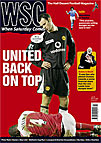 It may be painful, but let's hear it for Chelsea
It may be painful, but let's hear it for Chelsea
What’s the hardest three-word sentence to say in English? Come on, Chelsea. But we might as well start practising it. For a while this season, many football supporters will have reviewed with dismay the prospect of the Premiership title, and possibly several other trophies, heading to Stamford Bridge. Victories for a team funded by Roman Abramovich’s, let us say, contentiously acquired wealth would seem to be contrary to the basic principles of sporting competition. A club that two years ago sagged under the weight of debts of close to £100 million incurred by grotesque over-spending under Ken Bates could yet be quadruple winners this season.
But, let’s look at it another way. The New Model Chelsea are the purest possible distillation of what the Premiership is about, with no pretence that it has anything to do with fair competition – it’s just money, how much you have and how you spend it. The background is familiar through regular re-retelling. Since 1992, the Premier League’s television deals have brought in nearly £4 billion. But a bare fraction of this windfall has been passed down to Football League clubs, roughly half of whom have faced various forms of financial crisis including insolvency over the past 12 years.
Some erstwhile Premiership clubs have all but collapsed trying to keep up with the wealthiest handful, some of whose directors and major shareholders have made fortunes through stock-market flotations as they have sought to take every penny they possibly could out of the game. But no one, not even Manchester United with their merchandise stores in several continents, can possibly match Chelsea’s current spending power. However loathsome the money grabbing within the game, what we have seen within football is a pale shadow of capitalism Abramovich style. The second richest man in Russia courtesy of his proximity to Boris Yeltsin’s alcohol-fuelled presidency, he has a personal fortune of £7.5bn. He has spent what is to him a mere £340 million on Chelsea so far, some of which was just thrown away on deals for Juan Verón, Hernán Crespo and others. The record loss of £88m for the financial year 2003-04, enough to choke anyone else, is not even a mild hiccup to a man who is showing the game’s graspers how to do it.
The possibility that we might be wondering next year whether Chelsea could do a double quadruple has one other advantage. Such potential dominance puts into perspective the increasingly ugly personal feud between Arsène Wenger and Sir Alex Ferguson. Two of the best managers in League history continue to bicker away like two mad old residents in a nursing home and there appears to be no end to it, with fuel constantly added to the fire by the tabloids and Sky TV’s 24-hour “news” service. For the first time since they first fell out (irreparably, it would now appear), their row appears to have no relevance to the outcome of the title race – they’re trading blows in semi- darkness, lost in the enormous shadow cast by the Chelsea money mountain.
So, why not, let’s see Abramovich beaming modestly from the top deck of an open-topped bus trundling slowly through west London. Chelsea’s long-term supporters, who remember crowds of under 10,000 in the old Second Division and the era of the buffoon Bates, will enjoy it up to a point; the new fans who think the club’s history starts with Gianluca Vialli and Gianfranco Zola will lap it up.
But lurking in the background will be the nagging knowledge that the success is falsely acquired, that for all the fine play by John Terry, Frank Lampard et al and the organisational skills of the admirable José Mourinho, Chelsea’s will be toytown titles, bought for the entertainment of the biggest baby in the nursery. They will know it, we will know it, so let’s see the whole charade exposed by having them win everything.
From WSC 217 March 2005. What was happening this month